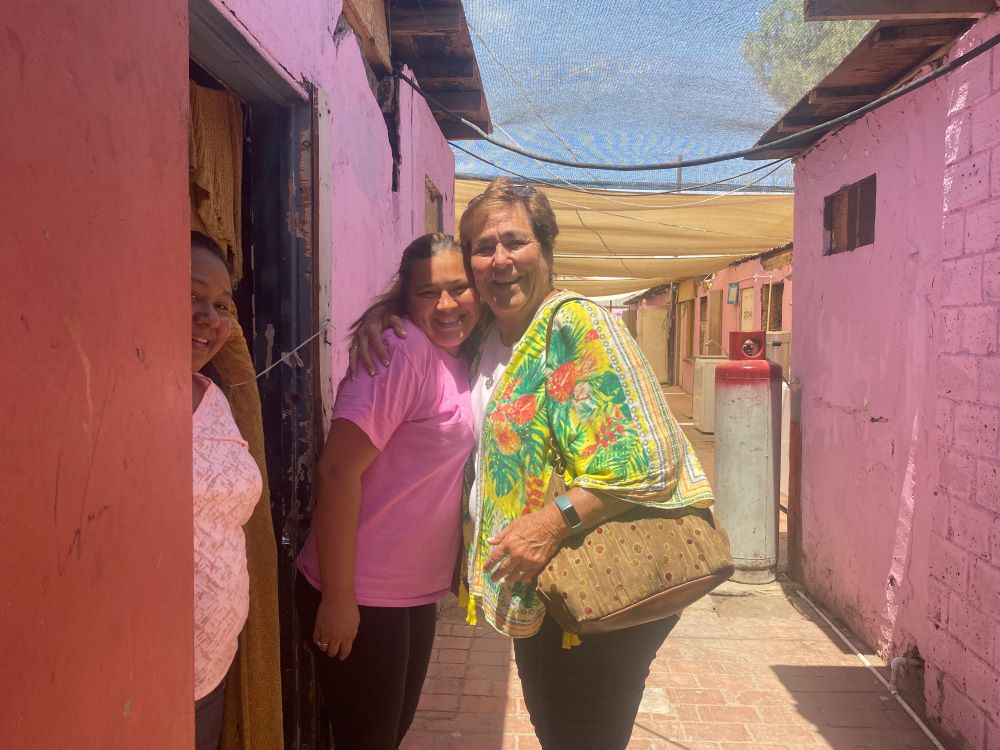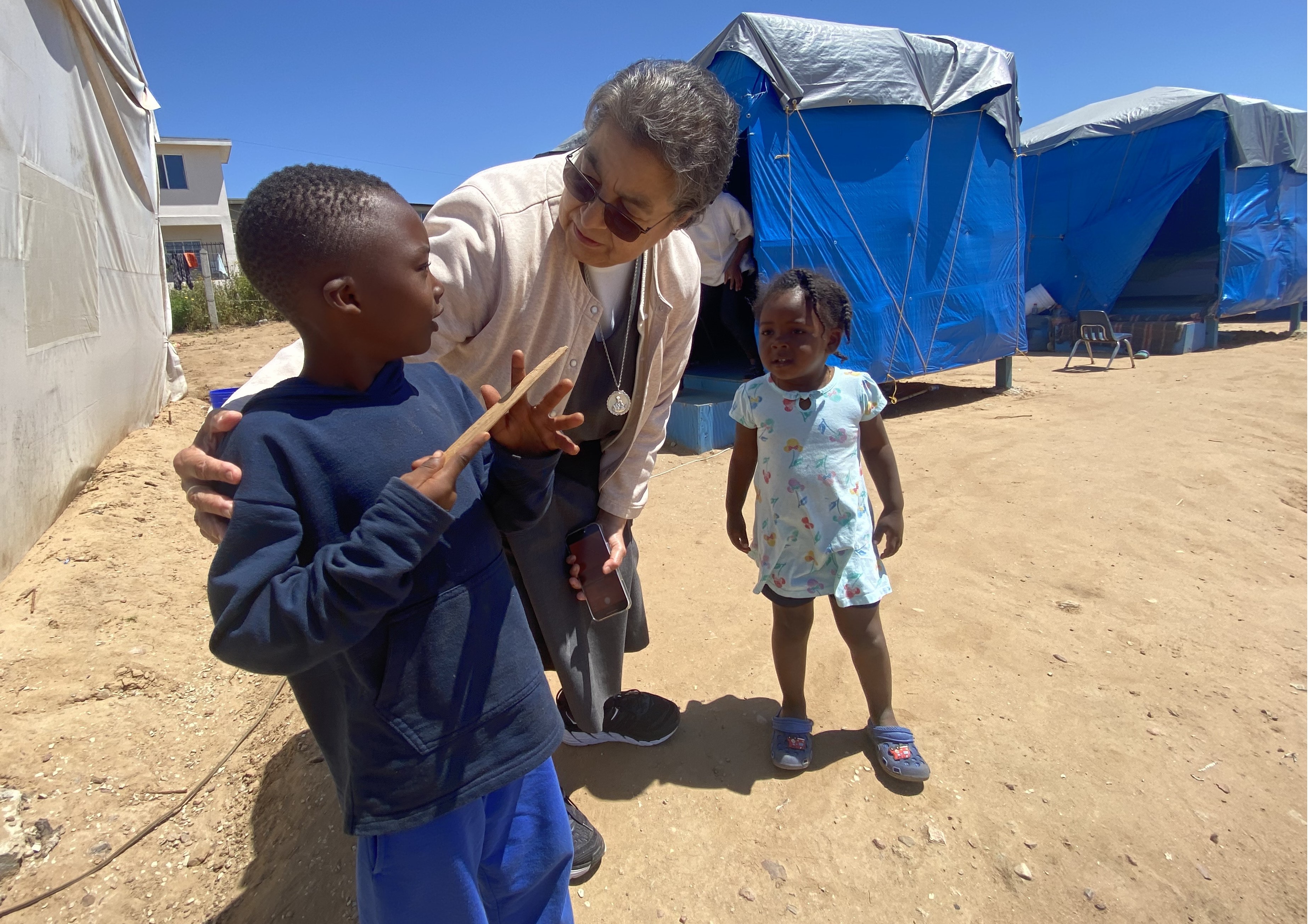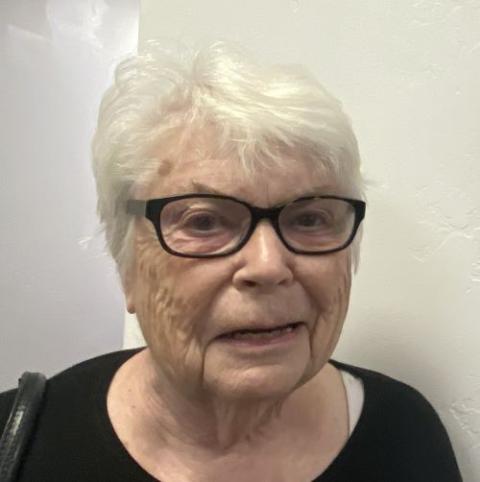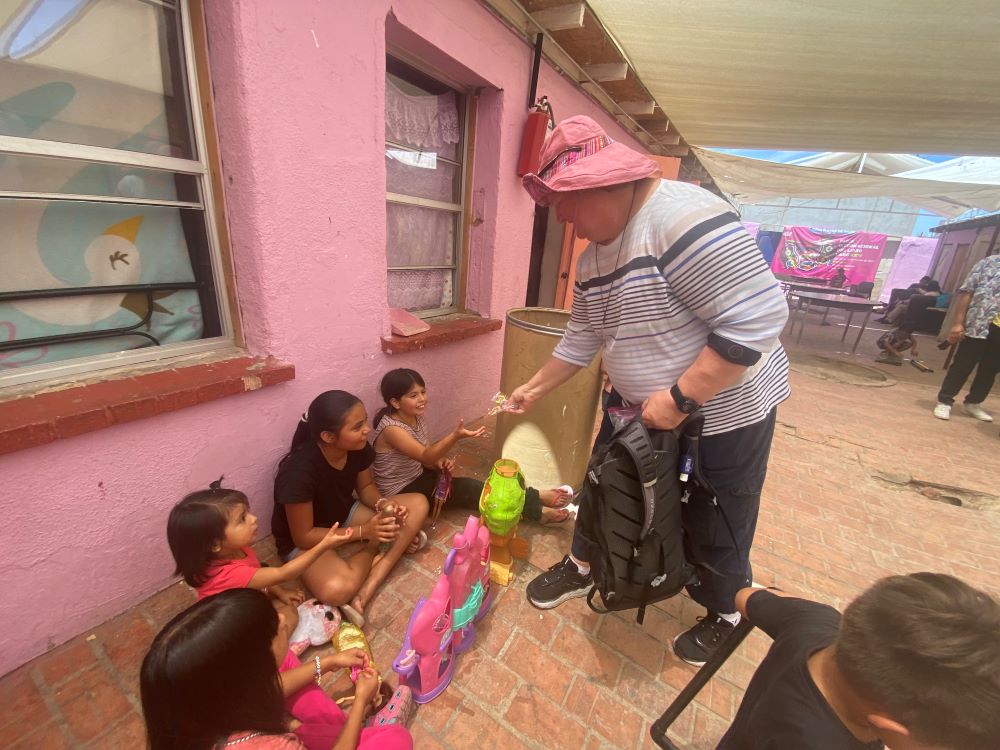
St. Joseph of Carondelet Sr. Suzanne Jabro receives a hug from a woman in Mexicali, Mexico, May 10, 2023, part of a visit through the Border Compassion ministry she founded. The organization is part of a coalition of women religious formed to help migrants on both sides of the border. (GSR photo/Rhina Guidos)
As organizations that help migrants and refugees find themselves under fire, more than two dozen U.S. congregations of women religious have pledged up to $300,000 to help the work of sisters who serve in immigration-related ministries on both sides of the U.S.-Mexico border near San Diego.
"It's the solidarity issue," Sr. Ann Durst, a lawyer and member of the Society of the Holy Child Jesus, told Global Sisters Report about the effort. "We speak for the poor here, north and south of the border."
Durst is part of the sister-led Transborder Coalition for Border Ministries. The group, backed by almost 30 congregations, is coordinating funding as well as sister volunteers from around the country to help organizations that provide legal information and representation, food and shelter, and some medical assistance in the border region. One congregation from Mexico also has joined.
"The notion that it transcends the border is important to us. That speaks not to U.S. immigration policy or to Mexico or to whatever. The focus is on the people and whatever needs they have," Durst said.
'We're folks who are just trying to be the presence of love in our broken-hearted world.'
—Sr. Lisa Buscher
Help on the U.S. side will focus on legal efforts by San Diego's Casa Cornelia Law Center, which Durst founded, and the Southern California Immigration Project. The coalition also will help Casa de Los Pobres in Tijuana, Mexico — which provides food and shelter — and Border Compassion, a nonprofit based in California, which helps a Mexican shelter near the Calexico-Mexicali border region. All organizations were founded or are run by women religious.
"We really would like to have an entity that speaks loud and clear to the solidarity of religious women on this issue," Durst said. "So, loud and clear, we are here."
Sisters are aiding migrants in the U.S. scrambling as legal doors shut around them with the suspension of asylum, and parole for some countries, as well as Temporary Protected Status. Others have been told to self-deport or face Immigration and Customs Enforcement agents. Even permanent residents worry now about staying in the country following high-profile arrests of green card holders.
California sisters reached out to congregations outside their state, including to regional Leadership Conference of Women Religious members, as well as provincials of certain women's congregations, to talk about the challenges they face as they serve suffering women, men and children stranded on both sides of the border.

Sr. Maru Espinoza, of the Franciscan Missionaries of Our Lady of Peace, greets children May 8, 2023, at a camp for Haitian refugees in Tijuana, Mexico, that belongs to the Casa de Los Pobres border ministry. The ministry will receive help from a coalition of women religious helping migrants on both sides of the border. (GSR photo/Rhina Guidos)
They agreed that they could pull together to help those affected by the rapid changes in U.S. immigration policy, which have left many stranded in the U.S. but also in Mexico. On the Mexico side, migrants hoping to enter the U.S. found themselves stranded as a phone app they were using to secure an interview to enter the country disappeared as soon as President Donald Trump took office Jan. 20.
"They can't go forward and they can't go back," said St. Joseph of Carondelet Sr. Suzanne Jabro. Her Border Compassion ministry helps migrants find respite in the Mexicali area, where the temperature sometimes has reached 120 degrees in summer.
After the Trump administration blocked a variety of legal pathways to enter the U.S., legally or otherwise, sisters serving near the border have been focusing on feeding and clothing a growing number families and individuals on the Mexico side who can't return home and now have to figure out where to go and what to do to survive, Jabro said.

Sr. Ann Durst, a member of the Society of the Holy Child Jesus, and an immigration lawyer, at Casa Cornelia Law Center (GSR photo/Rhina Guidos)
"They need a lot of help. The work continues, the accompaniment is the same. You have to learn to think different" when it comes to helping them, she told GSR.
That means enlisting the help of sisters and congregations who weren't involved in border ministry on a daily basis but who were eager to help, Jabro said.
"We've had these waves of these policies. It goes from one extreme to the other," Jabro said. "We have nobody [in the shelters], then we have 400."
The sisters' focus on helping has always been the same, the only thing that changes is the suffering that shifts from one side of the border to the other, she added.
On the California side, legal help for migrants is urgent, Durst said. Some sisters' ministries are trying to figure out whether there's a legal path forward for some migrants in the midst of court challenges, while also keeping others informed about their rights.
"There's a lot of fear. I mean, it's nationwide, but particularly here in this border area. And people are collaborating in very meaningful ways," Durst said.

Sr. Lisa Buscher, of the Society of the Sacred Heart, shares candy with children at a migrant shelter in Mexicali, Mexico, May 9, 2023. Buscher works with migrants and refugees in San Diego and nearby border communities through Border Compassion. (GSR photo/Rhina Guidos)
Sr. Lisa Buscher, of the Society of the Sacred Heart, who is based in San Diego and often helps with the work of Border Compassion, said it's hard to tell what to expect on the border. The only thing that's certain, she said, is that people still need help and that's what women religious focus on.
Places such as the Jewish Family Service of San Diego, Catholic Charities of San Diego and the Migrant Welcome Center closed, began laying off staff or temporarily halted services as funding stopped. That has created greater needs for congregations south of the border helping migrants; now, the coalition of sisters is trying to help them.
"We're not this great big group of people," Buscher told GSR. "We're folks who are just trying to be the presence of love in our broken-hearted world. We're just trying to be the face of mercy. We're just trying to be the face of compassion to our brothers and sisters who are crying out at this moment in their lives."
The coalition also has helped sisters face the suffering associated with the phenomena of mass immigration, one that oftentimes feels insurmountable, Buscher said.
"I think the greatest gift we have is that we have each other and we're supporting each other at this moment, because if you're doing this work alone, it's extremely exhausting. So much is coming at you and so much change is happening and you see so much need," she said.
Advertisement
The coalition also will provide moral support for women religious who have long served at the border, Buscher said.
"It just makes you feel like you're part of something bigger that can hold us, that can give us hope, that can help us," Buscher added. "You know that you're not alone in this. We're doing it together."
The new coalition doesn't form a new organization, Durst said, since existing ministries already are in place. It's a creative solution to channel the strength and support of other women religious in the U.S. with a commitment to migrants at a critical time, she said.
"We know this isn't going away. We know we somehow need to bring the essential resources to these people who are crying out," Buscher said. "We're all doing the best we can to do that across our congregations because we know the commands to feed the hungry and clothe the naked and visit the sick and shelter those who have no home."






